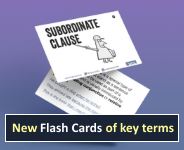Martian grammar: Activity 2
Aliens have landed on Earth, but don’t worry: they come in peace. Or at least, we think they do, but we can’t quite understand what they’re talking about.
Their language is not familiar and even highly trained experts are struggling to work out what they are saying. Your job is to work with the Martian examples that they have translated and work out some of the rules of their language. In doing so, you might even learn something about your own language.
»
- Printer-friendly version
- Log in to view or leave comments


